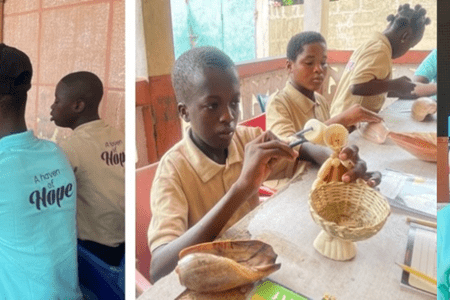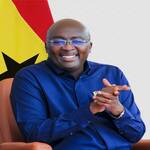When Madam Emma Sallah left the hustle and heartbreak of Accra for the quiet shores of Keta in the Volta Region, her heart was heavy with grief.
The death of her mother had left her shattered, and she hoped that a change of environment would offer some form of healing.
But what she found on her journey wasn’t just peace—it was purpose.
Keta, with its coastal breeze and quiet rhythm, is often seen as a place to retreat.
For Madam Sallah, it became the birthplace of a bold mission: bringing hope to children with intellectual disabilities—a group too often hidden, underserved, and misunderstood.
From healing to helping
During church services, Madam Sallah noticed a few special needs children.
Her curiosity piqued, she began asking questions.
Conversations with the local assembly revealed a troubling reality: children with special needs had almost no access to education in Keta and its environs due to lack of special needs schools.
The few who did attend school had to make a grueling 203-kilometre journey to Hohoe, just to access education.
For Madam Sallah, this struck a deep chord.
She wasn’t a stranger to the world of special needs.
Since 2012, she had worked at the Autism Awareness Care and Training Centre in Kokomlemle, Accra (now in Haatso), raising funds and championing awareness.
Her connection to the children had always been emotional—profound, personal, and unwavering.
It has always been her dream to make a positive impact on society.
That connection, combined with the silent cries of the children in Keta, she founded the Anloga Special School in October 2018.
But this wasn’t just a school born of compassion—it was born out of sacrifice.
She believes that everyone comes into this world to improve it, and that belief motivated her to undertake this journey.
Data from the 2021 Population and Housing Census (PHC) shows that of the 7,794,740 children aged 5-15 years, 219,022 have difficulty in performing activities.
Out of those with difficulty in performing activities, 35,609 have never attended school.
Generally, 8.6% of children 5-15 years in Ghana have never been to school.
However, for those with difficulty in performing activities, 16.3% have never attended school.
In 2018, about one fifth of Ghanaian children under 18 years old were reported to have a functioning difficulty.
The highest percentages of children with functioning difficulties were found in the Volta Region.
A classroom on a porch
With little to no resources, Madam Sallah transformed the porch of her childhood friend’s apartment into a classroom.
Each morning, children with conditions like autism, Down syndrome, and other intellectual disabilities arrive at her home, greeted by the warmth of her smile and the sanctuary of her makeshift school.
By 2pm, they leave—after eating free snacks and lunch, brighter eyes, and skills their parents had once thought impossible.
Everything is free—meals, education, therapy.
Because Madam Sallah knows the truth: most parents can’t afford to pay.
In fact, some of the parents have disabilities themselves.
The project was initially funded by an organic seafood business that Madam Sallah operated, where she packaged and sold them in Accra.
A few friends also joined her to support this project.
The school has also started a new project focused on creating art pieces from seashells.
They sell these creations and use the revenue to fund the school.
“I believe this project has been very impactful”, she said
She disclosed that recently, a gentleman conducting his thesis on disabilities visited the area and everywhere he engaged with the community, people mentioned the project to him.
Madam Sallah revealed that the man reached out and was truly impressed by what they are doing.
The school isn’t just teaching; it’s transforming.
Children who couldn’t speak are now expressing themselves.
Some are learning to perform household chores for the first time in their lives.
Others have competed in national disability events in Accra.
One mother, previously unable to care for her child due to her own special needs, now runs a charcoal business thanks to the school’s support.
This progress was recognised by a chief, who subsequently granted them land to build a school pending available funding.
Madam Sallah feels fulfilled knowing that her contributions are helping to improve people’s lives.
A community slowly awakening
The impact hasn’t gone unnoticed.
Assemblyman for Keta, James Ocloo Akorli, speaking as a community leader, described Madam Sallah as an extraordinary individual whose work is transforming lives.
He noted that the impact of her special school has been so profound that the local chief offered her land to build a dedicated facility—an opportunity that will allow the school to expand and reach even more children with special needs.
“We’ve never had a school like this here in Keta,” he said.
“She could have chosen to live anywhere and do anything, but she committed herself to this cause. For that selfless dedication, she truly deserves to be recognized and supported,” noted.
Even beyond the school gates, the ripples are being felt.
Madam Sallah organises health screenings, workshops for mainstream teachers, and public sensitization campaigns.
She is not just educating children—she is educating a society.
Moved by the incredible work Madam Emma Sallah and her team are doing at the Anloga Special School in Keta, Victoria Gadzekpo nominated them for MTN Heroes of Change Season 7.
Sharing what inspired her to put the school forward, Madam Gadzekpo—who has a background in managing children with special needs—said she was deeply impressed by the initiative.
“I recognized the significance of her work, especially given the limited facilities available for such children in Ghana.
“What struck me most was that she chose to do this in Keta—a place where support for children with intellectual disabilities is almost nonexistent,” she noted.
Madam Gadzekpo emphasized the demanding nature of running such a school, explaining that supporting children with special needs requires specific tools, toys, and learning aids—resources that are often very expensive.
“In light of these challenges, I believe Madam Sallah and her team truly deserve every form of support they can get,” she said.
“I feel both impressed and proud of her. At a time when most would have been overcome by grief, she turned her pain into purpose and created something so beautiful and life-changing.”
She further shared that much of her awareness of Madam Sallah’s work came through social media, where many have commended her dedication and impact.
According to her, feedback from the community has also been heartwarming.
“The children now have a space where they feel welcome—a place where they are accepted for who they are, without judgment,” she said.
While she acknowledged that her perspective is primarily based on online observation, Madam Gadzekpo believes the consistent praise and positive stories are a clear reflection of the school’s value.
“Even without witnessing everything firsthand, it’s clear that her work is making a real difference,” she concluded.
Madam Akpene Adzikah, whose son is a pupil at the school, shared the remarkable transformation she has witnessed in him since he joined the Anloga Special School.
Before his enrollment, she recalled, her son was extremely stubborn, frequently got into fights, and even bit people in the community.
“It was a very difficult time,” she said. “No one knew how to handle him.”
She explained that her initial attempts to place him in a regular school ended in disappointment, as the institution rejected him due to his behavior.
Feeling helpless and frustrated, she described Madam Sallah’s acceptance of her son as nothing short of divine intervention.
“Since Madam Sallah took him in, everything has changed,” she said with visible relief.
“He no longer exhibits those aggressive behaviors, and for the first time, he’s picking up English vocabulary.
“He can now express himself and communicate with others. Everyone who knows him is amazed at his progress,” she added.
With emotion in her voice, Madam Adzikah added, “Madam Sallah has truly done a wonderful thing for us. I can’t thank her enough.”
A plea for support, a call to action
But behind the joy, Emma battles daily struggles.
“Our biggest challenge is accommodation,” she admits. “We’re still using my porch. And funding… I have volunteers who work so hard. I want to support them, too. But we need help.”
The land is available. The vision is clear. But to build a proper school—a place where these children can thrive without limits—Madam Sallah needs financial support.
She does not seek praise. She seeks progress. She does not want glory.
She wants a future for children who are often forgotten before they are even seen.
Her work is a reminder that change doesn’t always begin in grand halls or boardrooms.
Sometimes, it begins on a humble porch—with a woman who dared to turn her personal pain into public healing.
She also listed stigma as another major challenge since people often label those who work with children with intellectual disabilities in a negative way.
Additionally, Madam Sallah mentioned accessibility as an issue, as not all of the children can reach their current location.
One of their future plans is to establish a school for the students and to enroll more of them to help them achieve their highest potential.
Tribute to a hero
In a world that often turns away from what it does not understand, Madam Sallah has chosen to lean in—to listen, to love, to teach, and to uplift.
Her story is not just one of resilience. It is one of radical compassion and unwavering faith in the potential of every child.
If heroes wear capes, hers is stitched with patience, purpose, and quiet power.
- Biggest Economic Risk is energy sector– Finance Minister - 23 April 2025
- Wednesday, April 23, 2025 Newspaper Headlines - 23 April 2025
- Free education and meals: One woman’s gift to special needs kids - 23 April 2025

